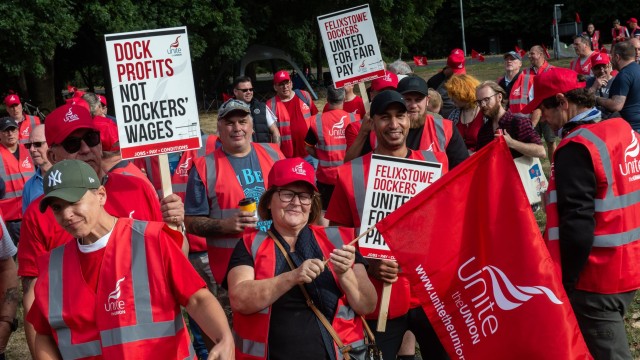The Felixstowe Dock and Railway Company is ‘massively profitable and incredibly wealthy’ and is ‘fully able to pay the workforce a fair day’s pay’, according to Unite
Nearly 2,000 dock workers at the UK’s biggest container port have gone on strike in a dispute over pay. Around 1,900 workers at the Port of Felixstowe, in Suffolk, have walked out on the first day of an eight-day strike, the latest eruption of industrial action to take place during the mounting cost of living crisis.
Here we look at what led to the latest strike action, and how it stands to affect shipping and supply chains.
Why have Felixstowe workers gone on strike?
As the cost of living crisis has spiralled, Felixstowe docks and its parent company, CK Hutchison Holdings, have enjoyed “massive profits” while failing to pay workers a “fair day’s pay”, the union leading the walkout, Unite, has argued.
The Felixstowe Dock and Railway Company is “massively profitable and incredibly wealthy” and is “fully able to pay the workforce a fair day’s pay”, Unite general secretary Sharon Graham said.
Instead, she insisted, it has “prioritised delivering multi-million pound” profits and shareholder dividends.
On Sunday, more than 1,900 Unite members began a strike, which will not end until next Monday.
What kind of pay deal were workers offered?
The company offered workers a seven per cent pay increase – in normal times this would be considered a large sum, but with inflation soaring, this represents a real-terms pay cut.
In July, prices rose by 10.1 per cent compared to a year before, according to the Consumer Price Index (CPI), one of the most frequently used measures of inflation. The Retail Price Index (RPI) put inflation at 11.8 per cent in June.
Ms Graham noted that relations between workers and bosses were “already strained” prior to the seven per cent offer as workers received a below-inflation increase of 1.4 per cent last year.
Who is striking?
Workers responsible for a host of manual roles at Felixstowe including crane drivers, machine operators and stevedores, who load and unload ships, are taking part.
A ballot of union members in July recorded a 92 per cent vote for industrial action on an 81 per cent turnout, according to Unite.
How essential is Felixstowe to UK supply chains?
Felixstowe is not only the UK’s largest and busiest container port, but also one of the largest in Europe. The business has proudly declared the “pivotal role” it plays in “keeping the UK’s trade moving”.
Almost half (48 per cent) of containers brought into the UK are transported via its quaysides, with around 17 shipping lines operating from Felixstowe, offering 33 services to and from over 700 ports around the world.
It is also Britain’s largest international rail facility, with around 75 trains arriving and departing daily.
Will supply chains be badly affected?
Unite national office for docks Bobby Morton said the stoppage will “cause huge disruption and will generate massive shockwaves throughout the UK’s supply chain”. But trade association Logistics UK, which represents firms that transport goods by road, rail, sea, and air, attempted to play down the impact of the walkout.
“Felixstowe is not a ‘just-in-time’ delivery port – everything coming in is scheduled well in advance,” it said.
“If [the strike] goes on for longer than eight days, then those using the port will be looking at alternative routes, but at the moment there is plenty of stock in the supply chain. Others have already been planning alternative routes – we’re not expecting panic.”
What has Felixstowe said?
Port spokesman Paul Davey said that workers at Felixstowe are paid on average £43,000, and that in addition to the seven per cent increase, employees had also been offered a one-off payment of £500. The total sum represented an increase of between 8.1 per cent and 9.6 per cent, depending upon the category of worker at the port, he said.
Mr Davey accused Unite of using the dispute to further what he claimed was the union’s “national agenda”.
“It serves their purpose well to have a strike here at Felixstowe… I know many [workers] feel they’re being used as pawns in this game,” he told the BBC Radio 4 programme Broadcasting House.
Credit: iNews
































































